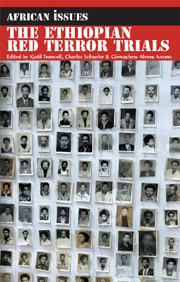Book contents
- Frontmatter
- Contents
- Notes on Contributors
- Preface
- Acknowledgements
- Abbreviations
- Glossary of Amharic Phrases
- 1 The ‘Red Terror’ Trials
- 2 The History of the Red Terror
- 3 The Rights of the Accused
- 4 The Role of the Special Prosecutor's Office
- 5 The Red Terror Trials versus Traditions of Restorative Justice in Ethiopia
- 6 A Quest for Justice or the Construction of Political Legitimacy?
- 7 Building State & Nation
- 8 Beyond the Red Terror Trials
- 9 Concluding the Main Red Terror Trial
- Index
4 - The Role of the Special Prosecutor's Office
Published online by Cambridge University Press: 12 September 2012
- Frontmatter
- Contents
- Notes on Contributors
- Preface
- Acknowledgements
- Abbreviations
- Glossary of Amharic Phrases
- 1 The ‘Red Terror’ Trials
- 2 The History of the Red Terror
- 3 The Rights of the Accused
- 4 The Role of the Special Prosecutor's Office
- 5 The Red Terror Trials versus Traditions of Restorative Justice in Ethiopia
- 6 A Quest for Justice or the Construction of Political Legitimacy?
- 7 Building State & Nation
- 8 Beyond the Red Terror Trials
- 9 Concluding the Main Red Terror Trial
- Index
Summary
Introduction
This chapter looks at some of the activities of the Ethiopian Special Prosecutor's Office (SPO) and its relationships with other key players in the prosecution of members of the former Ethiopian government for alleged crimes against humanity and genocide. It is not primarily concerned with evaluating the work done by the SPO. Nor does it assess whether pursuing the particular course of action chosen by Ethiopia in attempting to put down a marker against past impunity has been more or less successful than those adopted elsewhere, be they domestic or international processes. Rather, the chapter confines itself to some observations and reflections on how the SPO set about its work of investigation and prosecution; the extent to which policy decisions about the implementation of its mandate may have constrained a timely process; and how it related to four categories of interested parties: the Ethiopian judiciary, the international community, the executive of the Ethiopian government, and the Ethiopian public. In addition, some space is devoted to detailing different aspects of the work of the SPO, since relatively little has been published to date about the nature of the activities involved.
SPO's establishment – and the crisis of habeas corpus
The Office of the Chief Special Prosecutor of the Transitional Government of Ethiopia, was legally established by Proclamation 22/1992 issued by the Transitional Government of Ethiopia (TGE) on 8 August 1992, a full thirteen months after it had itself been established.
- Type
- Chapter
- Information
- The Ethiopian Red Terror TrialsTransitional Justice Challenged, pp. 51 - 67Publisher: Boydell & BrewerPrint publication year: 2009



